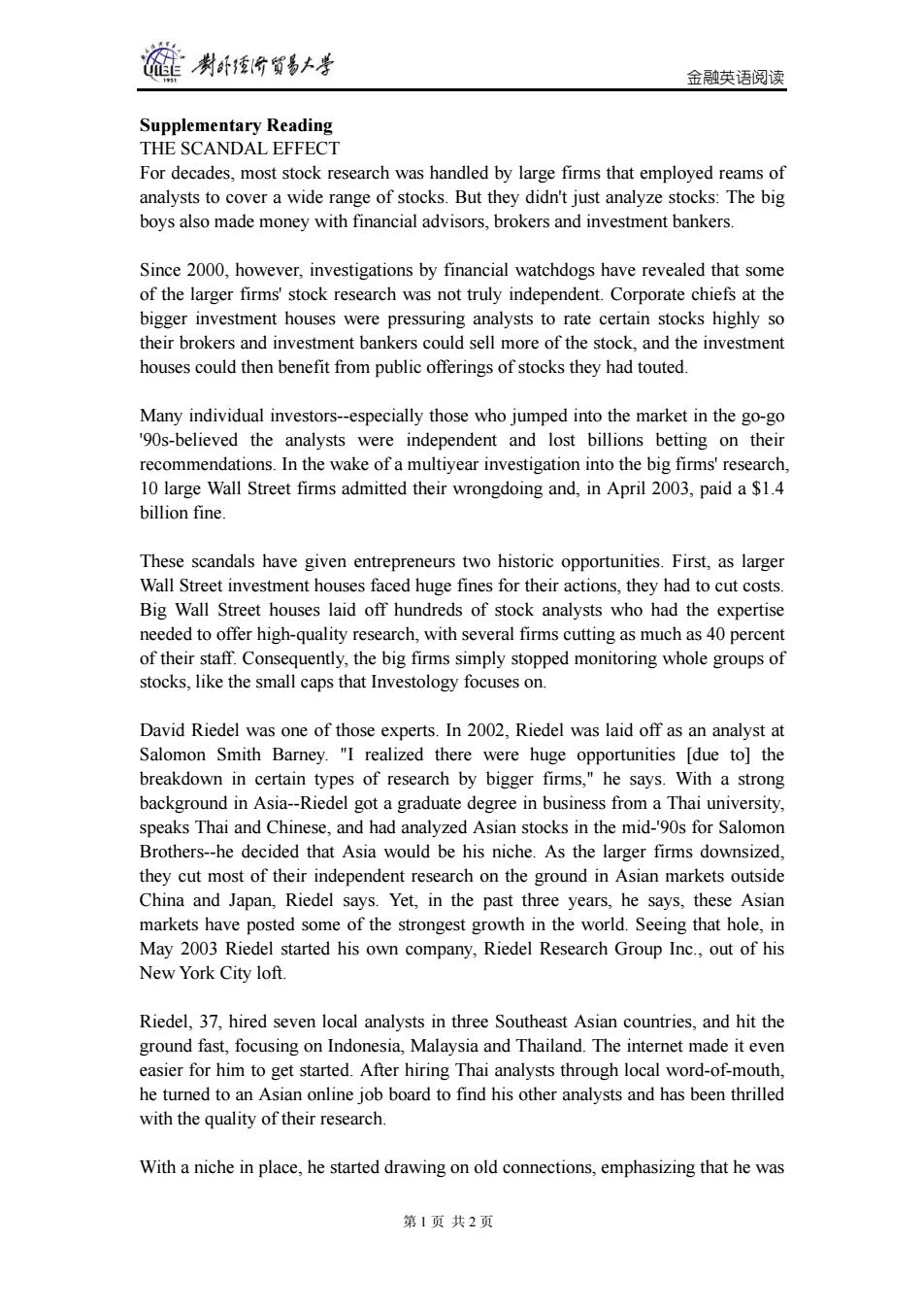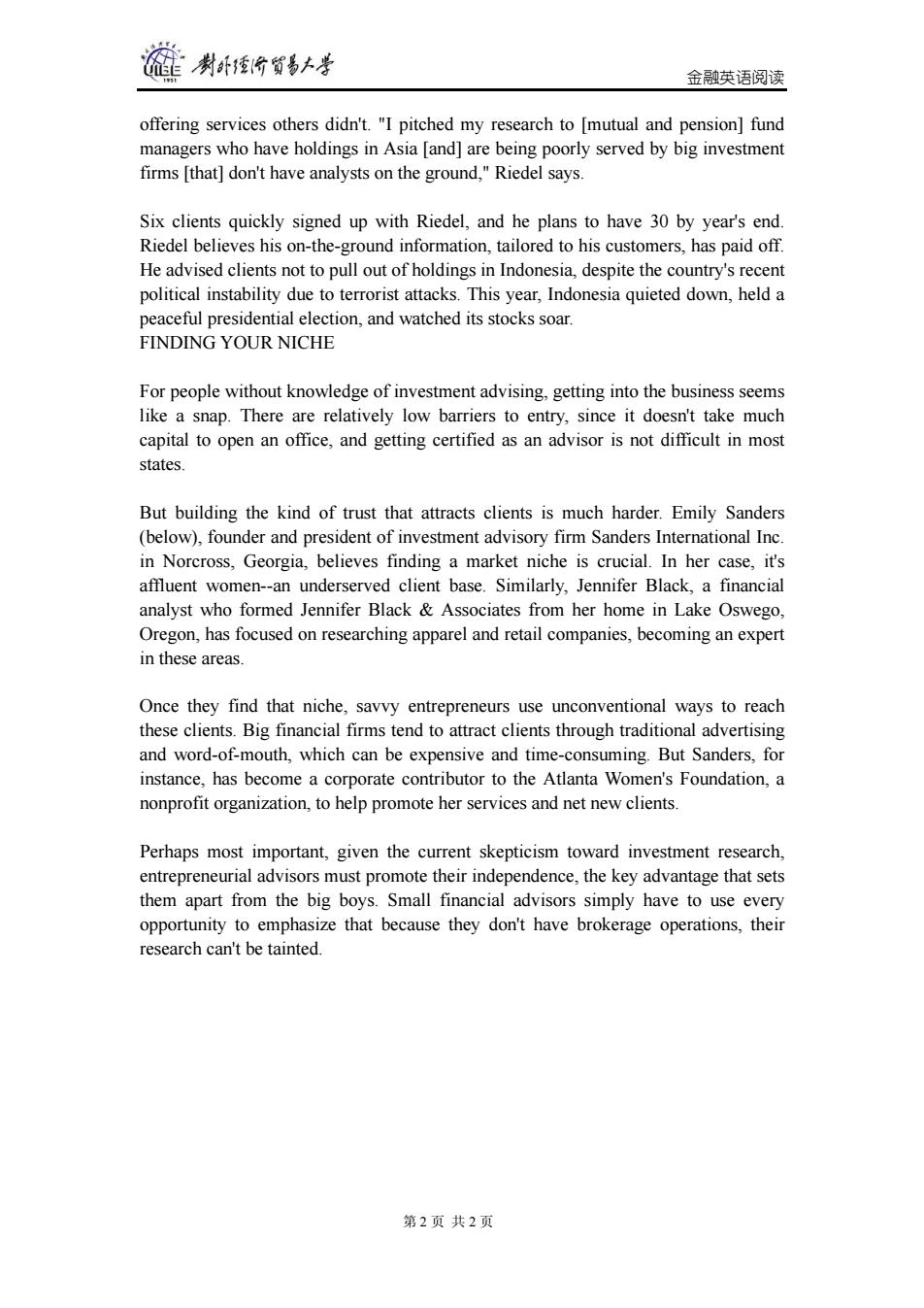
”制卧舍贸易上考 金融英语阅读 Supplementary Reading THE SCANDAL EFFECT For decades,most stock research was handled by large firms that employed reams of analysts to cover a wide range of stocks.But they didn't just analyze stocks:The big boys also made money with financial advisors,brokers and investment bankers. Since 2000,however,investigations by financial watchdogs have revealed that some of the larger firms'stock research was not truly independent.Corporate chiefs at the bigger investment houses were pressuring analysts to rate certain stocks highly so their brokers and investment bankers could sell more of the stock,and the investment houses could then benefit from public offerings of stocks they had touted. Many individual investors--especially those who jumped into the market in the go-go '90s-believed the analysts were independent and lost billions betting on their recommendations.In the wake of a multiyear investigation into the big firms'research, 10 large Wall Street firms admitted their wrongdoing and,in April 2003,paid a $1.4 billion fine. These scandals have given entrepreneurs two historic opportunities.First,as larger Wall Street investment houses faced huge fines for their actions,they had to cut costs Big Wall Street houses laid off hundreds of stock analysts who had the expertise needed to offer high-quality research,with several firms cutting as much as 40 percent of their staff.Consequently,the big firms simply stopped monitoring whole groups of stocks,like the small caps that Investology focuses on. David Riedel was one of those experts.In 2002,Riedel was laid off as an analyst at Salomon Smith Barney."I realized there were huge opportunities [due to]the breakdown in certain types of research by bigger firms,"he says.With a strong background in Asia--Riedel got a graduate degree in business from a Thai university, speaks Thai and Chinese,and had analyzed Asian stocks in the mid-'90s for Salomon Brothers--he decided that Asia would be his niche.As the larger firms downsized, they cut most of their independent research on the ground in Asian markets outside China and Japan,Riedel says.Yet,in the past three years,he says,these Asian markets have posted some of the strongest growth in the world.Seeing that hole,in May 2003 Riedel started his own company,Riedel Research Group Inc.,out of his New York City loft. Riedel,37,hired seven local analysts in three Southeast Asian countries,and hit the ground fast,focusing on Indonesia,Malaysia and Thailand.The internet made it even easier for him to get started.After hiring Thai analysts through local word-of-mouth, he turned to an Asian online job board to find his other analysts and has been thrilled with the quality of their research With a niche in place,he started drawing on old connections,emphasizing that he was 第1页共2页
金融英语阅读 Supplementary Reading THE SCANDAL EFFECT For decades, most stock research was handled by large firms that employed reams of analysts to cover a wide range of stocks. But they didn't just analyze stocks: The big boys also made money with financial advisors, brokers and investment bankers. Since 2000, however, investigations by financial watchdogs have revealed that some of the larger firms' stock research was not truly independent. Corporate chiefs at the bigger investment houses were pressuring analysts to rate certain stocks highly so their brokers and investment bankers could sell more of the stock, and the investment houses could then benefit from public offerings of stocks they had touted. Many individual investors--especially those who jumped into the market in the go-go '90s-believed the analysts were independent and lost billions betting on their recommendations. In the wake of a multiyear investigation into the big firms' research, 10 large Wall Street firms admitted their wrongdoing and, in April 2003, paid a $1.4 billion fine. These scandals have given entrepreneurs two historic opportunities. First, as larger Wall Street investment houses faced huge fines for their actions, they had to cut costs. Big Wall Street houses laid off hundreds of stock analysts who had the expertise needed to offer high-quality research, with several firms cutting as much as 40 percent of their staff. Consequently, the big firms simply stopped monitoring whole groups of stocks, like the small caps that Investology focuses on. David Riedel was one of those experts. In 2002, Riedel was laid off as an analyst at Salomon Smith Barney. "I realized there were huge opportunities [due to] the breakdown in certain types of research by bigger firms," he says. With a strong background in Asia--Riedel got a graduate degree in business from a Thai university, speaks Thai and Chinese, and had analyzed Asian stocks in the mid-'90s for Salomon Brothers--he decided that Asia would be his niche. As the larger firms downsized, they cut most of their independent research on the ground in Asian markets outside China and Japan, Riedel says. Yet, in the past three years, he says, these Asian markets have posted some of the strongest growth in the world. Seeing that hole, in May 2003 Riedel started his own company, Riedel Research Group Inc., out of his New York City loft. Riedel, 37, hired seven local analysts in three Southeast Asian countries, and hit the ground fast, focusing on Indonesia, Malaysia and Thailand. The internet made it even easier for him to get started. After hiring Thai analysts through local word-of-mouth, he turned to an Asian online job board to find his other analysts and has been thrilled with the quality of their research. With a niche in place, he started drawing on old connections, emphasizing that he was 第 1 页 共 2 页

制卧价贸易+学 金融英语阅读 offering services others didn't."I pitched my research to [mutual and pension]fund managers who have holdings in Asia [and]are being poorly served by big investment firms [that]don't have analysts on the ground,"Riedel says. Six clients quickly signed up with Riedel,and he plans to have 30 by year's end. Riedel believes his on-the-ground information,tailored to his customers,has paid off. He advised clients not to pull out of holdings in Indonesia,despite the country's recent political instability due to terrorist attacks.This year,Indonesia quieted down,held a peaceful presidential election,and watched its stocks soar. FINDING YOUR NICHE For people without knowledge of investment advising,getting into the business seems like a snap.There are relatively low barriers to entry,since it doesn't take much capital to open an office,and getting certified as an advisor is not difficult in most states. But building the kind of trust that attracts clients is much harder.Emily Sanders (below),founder and president of investment advisory firm Sanders International Inc. in Norcross,Georgia,believes finding a market niche is crucial.In her case,it's affluent women--an underserved client base.Similarly,Jennifer Black,a financial analyst who formed Jennifer Black Associates from her home in Lake Oswego, Oregon,has focused on researching apparel and retail companies,becoming an expert in these areas. Once they find that niche,savvy entrepreneurs use unconventional ways to reach these clients.Big financial firms tend to attract clients through traditional advertising and word-of-mouth,which can be expensive and time-consuming.But Sanders,for instance,has become a corporate contributor to the Atlanta Women's Foundation,a nonprofit organization,to help promote her services and net new clients. Perhaps most important,given the current skepticism toward investment research, entrepreneurial advisors must promote their independence,the key advantage that sets them apart from the big boys.Small financial advisors simply have to use every opportunity to emphasize that because they don't have brokerage operations,their research can't be tainted. 第2页共2页
金融英语阅读 offering services others didn't. "I pitched my research to [mutual and pension] fund managers who have holdings in Asia [and] are being poorly served by big investment firms [that] don't have analysts on the ground," Riedel says. Six clients quickly signed up with Riedel, and he plans to have 30 by year's end. Riedel believes his on-the-ground information, tailored to his customers, has paid off. He advised clients not to pull out of holdings in Indonesia, despite the country's recent political instability due to terrorist attacks. This year, Indonesia quieted down, held a peaceful presidential election, and watched its stocks soar. FINDING YOUR NICHE For people without knowledge of investment advising, getting into the business seems like a snap. There are relatively low barriers to entry, since it doesn't take much capital to open an office, and getting certified as an advisor is not difficult in most states. But building the kind of trust that attracts clients is much harder. Emily Sanders (below), founder and president of investment advisory firm Sanders International Inc. in Norcross, Georgia, believes finding a market niche is crucial. In her case, it's affluent women--an underserved client base. Similarly, Jennifer Black, a financial analyst who formed Jennifer Black & Associates from her home in Lake Oswego, Oregon, has focused on researching apparel and retail companies, becoming an expert in these areas. Once they find that niche, savvy entrepreneurs use unconventional ways to reach these clients. Big financial firms tend to attract clients through traditional advertising and word-of-mouth, which can be expensive and time-consuming. But Sanders, for instance, has become a corporate contributor to the Atlanta Women's Foundation, a nonprofit organization, to help promote her services and net new clients. Perhaps most important, given the current skepticism toward investment research, entrepreneurial advisors must promote their independence, the key advantage that sets them apart from the big boys. Small financial advisors simply have to use every opportunity to emphasize that because they don't have brokerage operations, their research can't be tainted. 第 2 页 共 2 页